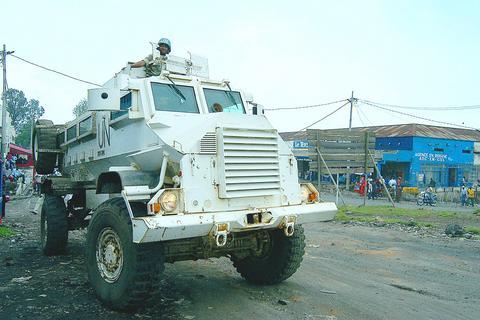The UN reported Thursday that thousands of civilians had fled a battle zone in the eastern Congo near the Rwanda border, heightening fears that the Congo war, which has claimed as many as 3 million lives, may be erupting once more.
But the Rwandan government, which played a crucial role in the hostilities that began in 1998 and, officially at least, ended early last year, rejected what UN observers called "corroborating clues" that its troops had entered eastern Congo, defying a recent international peace agreement.

PHOTO: EPA
The UN mission in Congo told news services that it had aerial photographs and ground sightings indicating that Rwandan troops had crossed the border into Congo. The evidence included encounters with soldiers who appeared to carry Rwandan military gear and the sighting of a group of about 100 soldiers who appeared to be of Rwandan origin.
UN officials also were quoted as saying that thousands of civilians had fled the area around Goma, in eastern Congo, amid fierce fighting between Rwandan rebels and an unidentified force.
Richard Sezibera, an adviser to Rwanda's president, Paul Kagame, said at a news conference on Thursday that reports of Rwandan troops entering Congo were false.
He added, however, that "if it became necessary in the defense of Rwandan territory, her sovereignty and her people and in pursuit of genocidal forces in the territory of the Democratic Republic of Congo, Rwanda would be forced to enter."
A Rwandan incursion would be a major setback for international efforts to resolve the conflict in Congo, which in the past year has drawn in the military forces of at least seven neighboring nations on both sides.
Twice before, in 1996 and 1998, Rwanda's Tutsi-led government has sent troops into Congo for the stated purpose of routing Hutu rebels, at least some of whom are former Rwandan soldiers who participated in the massacre of 800,000 Rwandan Tutsi and moderate Hutu in 1994.
The UN has mounted an effort with Congolese and Rwandan officials to disarm the Hutu rebels, but Rwandan officials say the disarmament effort has moved too slowly and that the rebels frequently have attacked Rwandan territory.
Some private analysts say, however, that Rwanda wants to promote instability in the region to increase its control of the area's rich natural resources, which include diamonds, gold and coltan, a crucial ingredient in cell phone circuit boards.
The UN has accused Rwanda, Uganda and Burundi of stealing vast quantities of coltan from Congo, which holds some 80 percent of the world's known reserves of the mineral.
Sezibera, the Rwandan president's adviser, dismissed those accusations as part of what he said was a smear campaign by Western analysts and Congolese officials against the Rwandan government.
On Thursday the EU's foreign-policy representative, Javier Solana, warned Rwandan officials that an invasion of eastern Congo would violate both international principles and a Nov. 20 agreement among 14 of the region's nations to work toward peace in the troubled region.

Tens of thousands of Filipino Catholics yesterday twirled white cloths and chanted “Viva, viva,” as a centuries-old statue of Jesus Christ was paraded through the streets of Manila in the nation’s biggest annual religious event. The day-long procession began before dawn, with barefoot volunteers pulling the heavy carriage through narrow streets where the devout waited in hopes of touching the icon, believed to hold miraculous powers. Thousands of police were deployed to manage crowds that officials believe could number in the millions by the time the statue reaches its home in central Manila’s Quiapo church around midnight. More than 800 people had sought

DENIAL: Pyongyang said a South Korean drone filmed unspecified areas in a North Korean border town, but Seoul said it did not operate drones on the dates it cited North Korea’s military accused South Korea of flying drones across the border between the nations this week, yesterday warning that the South would face consequences for its “unpardonable hysteria.” Seoul quickly denied the accusation, but the development is likely to further dim prospects for its efforts to restore ties with Pyongyang. North Korean forces used special electronic warfare assets on Sunday to bring down a South Korean drone flying over North Korea’s border town. The drone was equipped with two cameras that filmed unspecified areas, the General Staff of the North Korean People’s Army said in a statement. South Korea infiltrated another drone

COMMUNIST ALIGNMENT: To Lam wants to combine party chief and state presidency roles, with the decision resting on the election of 200 new party delegates next week Communist Party of Vietnam General Secretary To Lam is seeking to combine his party role with the state presidency, officials said, in a move that would align Vietnam’s political structure more closely to China’s, where President Xi Jinping (習近平) heads the party and state. Next week about 1,600 delegates are to gather in Hanoi to commence a week-long communist party congress, held every five years to select new leaders and set policy goals for the single-party state. Lam, 68, bade for both top positions at a party meeting last month, seeking initial party approval ahead of the congress, three people briefed by

Cambodia’s government on Wednesday said that it had arrested and extradited to China a tycoon who has been accused of running a huge online scam operation. The Cambodian Ministry of the Interior said that Prince Holding Group chairman Chen Zhi (陳志) and two other Chinese citizens were arrested and extradited on Tuesday at the request of Chinese authorities. Chen formerly had dual nationality, but his Cambodian citizenship was revoked last month, the ministry said. US prosecutors in October last year brought conspiracy charges against Chen, alleging that he had been the mastermind behind a multinational cyberfraud network, used his other businesses to launder